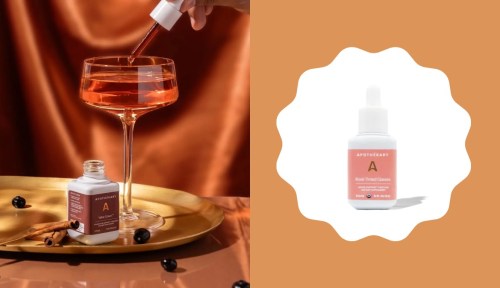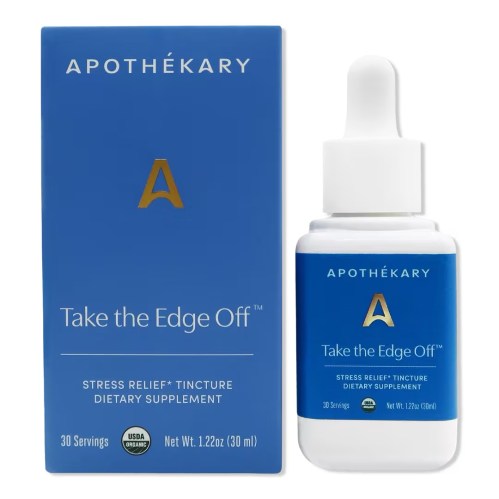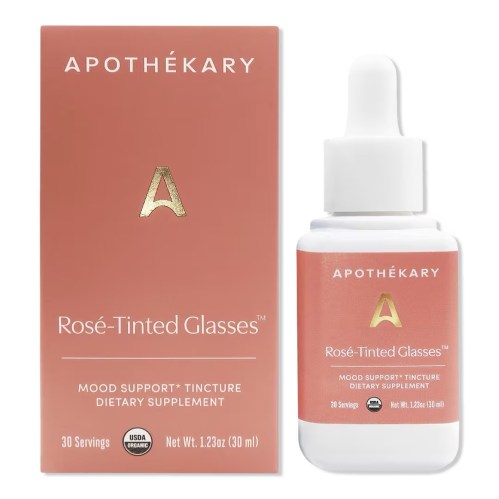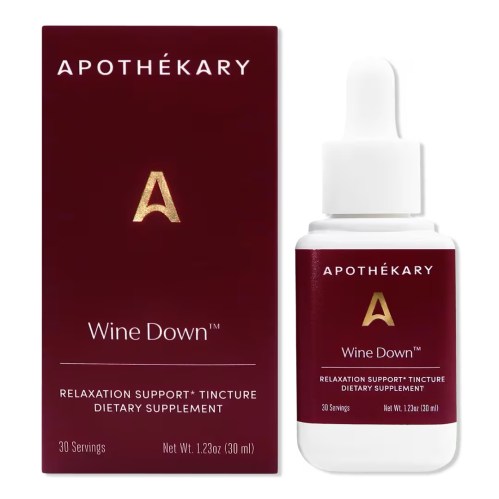Our editors independently select these products. Making a purchase through our links may earn Well+Good a commission
These Herbal Tinctures Got Me To Kick Alcohol And Gave Me The Best Sleep (And Lowest Stress Levels) Of My Life
Apothekary wellness tinctures are meant to replace a glass of wine, and got me to kick alcohol while delivering great sleep and low stress.

It’s been… a year. Let’s not go there with the details—mostly because I don’t want to think about them during the one week of the year when my brain is filled with nothing but Bravo—but I think we can all agree that the end of 2024 called for one 7-11-sized Big Gulp of Cabernet.
Experts in This Article
Hilary Sheinbaum is a lifestyle expert and author of “The Dry Challenge: How to Lose the Booze for Dry January, Sober October, and Any Other Alcohol-Free Month.”
founder and CEO of Apothekary, an herbal blend company
And yet: I’ve chosen this December to go (mostly) dry, which is admittedly out of character. I’m typically the girl who chills out and celebrates with a cocktail in hand and ’tis the season with endless opportunities for both. But as much as alcohol helps me wind down and makes me feel good in the moment, the next day, it’s a totally different story. Even one drink screws with my sleep and spikes my anxiety, and this year, that just wasn’t going to fly.
With my wedding coming up just two weeks after Christmas, I wanted to end the year feeling like the best (read: least anxious and exhausted) version of myself—which has meant trading my cocktails for herbal tinctures.
What are herbal tinctures?
I was first introduced to wellness tinctures during a trip to Japan. Apothékary, an herbal wellness brand that recently launched in Ulta, invited a group of editors to Kyoto to explore the art of herbal medicine and immerse ourselves in the Japanese philosophy of self-care.
For those unfamiliar, wellness tinctures are liquid-form supplements crafted from concentrated extracts of herbs, plants, adaptogens, and other natural ingredients. These extracts are often suspended in alcohol or glycerin to maximize their medicinal benefits.
“A tincture is the most effective way to extract the vital compounds from natural sources using alcohol,” Lianna Sugarman, founder of LuliTonix, previously explained to Well+Good. “This method delivers the most concentrated benefits of roots, herbs, and plants.”
Herbal medicine has deep roots in cultures worldwide, and in Japan, it remains a cornerstone of healthcare. “Herbal medicine is the primary form of care in Japan,” says Shizu Okusa, Apothékary’s founder, noting that the practice is quite different than what we see in the US. She explains that people will go into doctor-run “shops” to get a personalized health analysis and leave with a prescription of pills, plants, and herbs. “In everything that we do [at Apothekary], we try to bottle that up so that people can use the goodness of the natural world to heal themselves in a way that’s accessible.”
My week in Kyoto felt like stepping into a masterclass in mindfulness. I ventured into serene woods for guided forest bathing, arranged flowers during an Ikebana class, savored matcha tea in quiet contemplation, and soaked in the rejuvenating waters of an onsen. I even meditated alongside a Buddhist monk. Each experience was a lesson in slowing down and reconnecting with myself.
During my week-long stay in Kyoto I was enriched in not only the herbal medicines that had inspired Apothékary’s tinctures but also the Japanese approach to self-care that has made them such an important part of my routine. Each of the above experiences was unique (and so, so special), but what they had in common is that they forced me to slow down and actually focus on myself. By the end of the trip, I found this mindfulness working its way into my daily routine—and Apothekary’s tinctures have played a huge part in that.
My honest review
What I love
As someone who’s never before taken a supplement for more than three days in a row, I’ve been shocked at how easy it’s been to commit to adding Apothékary’s tinctures into my routine. For starters, they taste really good, which makes me genuinely excited to take them. I like to drop them in a cup of warm lemon water in the morning or mix them into a glass of sparkling water for an evening mocktail.
They’re also super cute; Apothekary’s tinctures come in pretty white bottles with jewel-toned labels and cute names. I leave them out on my counter—which is a true testament to how aesthetic they are—and know that my burgundy “Wine Down“($39) tincture will put me to sleep, my baby pink “Rosé Tinted Glasses” ($39) will make me happy, and the blue ‘Take The Edge Off” ($39) will help me chill out.
Beyond that, though, they deliver on the benefits they promise—honestly, I’ve never felt better. I first started taking the tinctures in Japan, and have spent the months since finessing my routine. And now that I’ve ditched the alcohol, I’ve been able to see just how powerful they are all on their own. The things I used to turn to a glass of wine for—like calming my stress, boosting my mood, or helping me sleep—I’ve now found in Apothekary’s tinctures.
“Alcohol has become such a ritual for people at the end of the day, or when they’re on a date or hanging out with friends, so it’s great to have something that’s readily available and easy to use,” says Hilary Sheinbaum, founder of Going Dry and author of The Dry Challenge. “Sometimes it’s easier to replace your alcoholic beverage with a baby step. Instead of saying you’re going to swap in a five-minute meditation or a 5 p.m. workout, you’re pouring a glass of something that *isn’t* a cocktail, so you’re still able to sip and sit with your beverage, it’s just not giving you a buzz.”
Not only have the tinctures taken the place of my not-so-great wine habit, but they’ve also driven me to add more positive habits into my routine. Now, I start each day with a glass of warm lemon water and close out the night with a cup of herbal tea, and I’m getting the added benefits of both practices… and that’s not to mention the hangovers I’ve been saved from as a result of switching from martinis to a La Croix spiked with “Rosé Tinted Glasses.”
What I don’t love
At $39 a bottle, they’re a bit expensive—especially if you’re trying to build a routine with multiple blends. While they do last a while, the cost can add up quickly if you’re incorporating more than one into your daily lineup. Also worth noting: Just because they’re natural doesn’t mean they’re for everyone. Herbal ingredients can interact with medications or certain medical conditions, so you’ll need to consult your doctor before diving in. Better safe than sorry!
Still, Apothekary’s tinctures have been easy to integrate into my routine and give me the same sleep-improving and stress-relieving benefits as my usual glass of wine. Simply put, they add mindfulness to my day and keep my mood high and anxiety low, which is exactly how I want to start off 2025.
Shop the tincture routine that got me to kick alcohol
For anxiety

Apothékary, Take the Edge Off Stress Relief Tincture — $39.00
Alcohol’s relationship with anxiety is complicated. It can help to ease it in the short term by calming the nervous system and releasing feel-good hormones, but in the long term—or even the next day—there’s a crash, which can make it a whole lot worse. In other words? Hangxiety is real.
FWIW, this is the main reason I decided to do a “dry December,” which meant I needed to find something else to keep my anxiety—which had had one hell of a year—at bay. Enter: Apothekary’s “Take the Edge Off.” It’s marketed as a white wine alternative and blends plant-powered adaptogens like skullcap, passionflower, linden, and oatstraw, which are known for their ability to calm the nervous system and reduce stress.
“Take the Edge Off “has quickly become the most important tincture in my toolkit. I start every day by drinking a few drops in a cup of warm lemon water and keep it with me throughout the day in case I need a little extra boost. Every time I take this particular tincture, I make it a point to pair it with a one-minute breathing exercise (5-7-8 is my personal favorite) for a double-duty nervous system reset. Simply put, it helps to keep my anxiety low and ensures I’m *not* craving a glass of wine by the time the day is over.
For mood

Apothékary 'Rosé-Tinted Glasses' Mood Support Tincture — $39.00
One of the hardest things about cutting out alcohol is the social component—for me, personally, it feels weird to walk around a holiday party without a cocktail in my hand and the mood boost that comes along with being buzzed. “Rosé Colored Glasses” has been the cure for that awkwardness, because it allows me to order a sparkling water and make my own mood-boosting cocktail (yes, I keep it in my purse) any time I’m out and about.
Rosé Colored Glasses is cute, pink, and delicious, and really does remind me of a glass of rosé. Adaptogens like lion’s mane, schisandra berry, and Siberian ginseng boost your mood and mental clarity, which is exactly what I need when I’m going into a big social event. Better yet? It tastes so good—so much so that I actually now prefer drinking an Apothekary mocktail to anything with booze.
For sleep

Apothékary 'Wine Down' Relaxation Support Tincture — $39.00
Gulping down a glass of red wine used to be my favorite way to unwind at night—but now, it’s sipping a cup of herbal tea infused with Apothekary’s “Wine Down.”
The tincture is designed to mimic the benefits of red wine without the less-than-ideal side effects. It blends soothing adaptogens like elderberry and hawthorn berry, which offer antioxidant benefits similar to those found in red wine’s polyphenols. What makes it better than a cup of cabernet, though, is the fact that it’s sugar-and-alcohol free—which means no hangovers. Plus, while red wine can initially make you drowsy, its alcohol content may disrupt deep sleep cycles. Wine Down’s ingredients like California poppy, tart cherry, and L-theanine actively support restful sleep without negative side effects.
I love the process of concocting my nightly “potion,” brewing myself a cup of tea and then sipping on it while I write in my journal or read before bed. FWIW? My sleep score has never been better.










